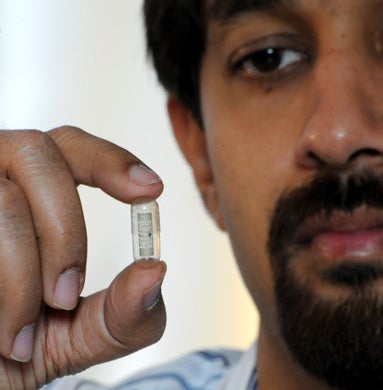Chip in a Pill Tells Your Doctor When You Swallow Your Medicine — and When You Don’t
So much for going off your meds. University of Florida researchers have created an ingestible pill capsule fitted with a...

So much for going off your meds. University of Florida researchers have created an ingestible pill capsule fitted with a tiny microchip and antenna that alerts doctors or family members each time a pill is taken. Miss a dose and you’re busted.
For now the pill exists only in prototype form, but researchers and clinicians hope it paves the way toward a smart pill future, in which patients take their medications in a more timely manner. Studies have shown again and again that patients have a horrible track record when it comes to taking their pills; in some cases, studies have shown that sufferers of chronic illnesses normally take only half of their prescribed medications, and that patient noncompliance with prescriptions is responsible for over 200,000 deaths each year.
The prototype pills are standard white, with an antenna that is printed onto the surface of the pills with silver nanoparticles. The capsule also contains a tiny microchip about the size of the period at the end of this sentence.
When the pill is taken, the microchip beams a signal to an external receiver — for now it’s a stand-alone device but in commercial versions could be built into a bracelet, necklace or directly to a cell phone — which in turn transmits a signal to a phone or computer that informs doctors or loved ones that the pill has been consumed. There is no battery on board the pill because it is powered by tiny bursts of low-voltage charge transmitted from the external device.
The antenna breaks down when introduced to the body’s natural processes, and the microchip passes safely through the digestive tract. And like that, patients and their doctors have a digital record of dosage as well as a way to ensure that a patient hasn’t decided to go rogue and give up his or her meds altogether.
The system could be great for older people who, loveable curmudgeons though they may be, sometimes forget what pills to take when. But its an even greater boon to clinical researchers studying the effects of new drugs during trials. A failure among trial participants to take their meds as scheduled can skew the results of a trial and tie up potentially great drugs in the trial process for longer than is necessary.